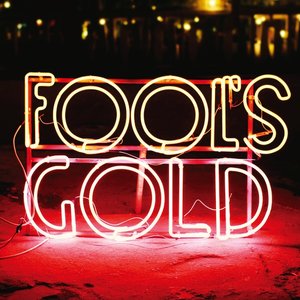There’s a scene in an early episode of the American TV comedy 30 Rock where Alec Baldwin’s big boss character is showing a newcomer around, making introductions and offering up brief, need-to-know snippets of information about the show’s cast and crew. He stops at James ‘Toofer’ Spulock, a proud African American college graduate and confides: “We call him Toofer because with him you get a two-for-one; you get a black guy and a Harvard guy.” Whether or not they would be happy with such a throwaway, dismissive summation, listening to the 2009 eponymous debut from L.A. band Fool’s Gold always made me think of that quote. Whilst keen to avoid comparison to the likes of Vampire Weekend, Fool’s Gold made no attempt to hide their love of ‘world’ music, cranking out faithfully rendered African-inspired pop whilst singer Luke Top warbled away over the top in – wait for it – Hebrew. Now, how’s that for a two-for-one?
If all that sounds just a little too gimmicky, rest assured the collective’s cultural cut-and-shut actually worked remarkably well. For one thing, Top’s vocals helped differentiate them from the wave of bandwagon-jumping American (and British) groups appropriating African sounds, making their music sound (to non-Hebrew speakers at least) more exotic, more otherworldly, more authentic. In fact, with its Afrobeat and Highlife stylings flavoured with nods to the desert-blues Touareg sound and the brutal, electrified percussion favoured by the Congotronics crew, Fool’s Gold turned out to be one of that summer’s most enduring and underrated records; thinking man’s dance music bursting with earworm hooks and the lush vibrancy of big band jazz.
Leave No Trace, the group’s sophomore offering, seems to suffer ever so slightly from a kind of inverted version of the dreaded ‘second album syndrome’. There is certainly no shortage of new ideas here – among them a stronger emphasis on Western pop structures, a synth-heavy new wave influence and most noticeably Top’s decision to sing almost exclusively in English – it’s just that none of them stick quite as well as their original concept. The vocalist’s keening voice still expresses a sorrowful yearning, but with the lyrics revealed as – frankly – nothing particularly meaningful, a lot of the mystique is stripped away. It’s like tracking down someone you had a holiday romance with and finding out that back on their own turf, living their own everyday life, they’re just as normal and pedestrian as everyone else.
Another big change that doesn’t appear to have worked entirely in the group’s favour is the downsizing to a more traditional five-piece set-up. Fool’s Gold may have been a packed-out party, with anywhere up to fifteen players contributing horns, keys, guitars and percussion, but every part was meticulously arranged and performed with a taut precision that recalled the original, real-deal Afrobeat orchestras of the 1970s. Leave No Trace favours synths over horns – in fact, it’s not until about ten minutes in that we get our first taste of brass – and whilst the sound is still impressively full-bodied, without the continuous stream of interwoven saxophone and trumpet solos that made its predecessor such a joyous affair it feels pretty empty in comparison.
All of which isn’t to suggest Leave No Trace is a disappointment; if this were a debut album all the signs would be pointing towards a bright future. Tracks like ‘The Dive’ and ‘Wild Window’, with their melancholy melodies and jangling guitars, recall ‘80s indie icons like the Smiths and the Bunnymen, whilst ‘Street Clothes’ takes an unexpected detour into disco-funk territory. Closing ballad ‘Lantern’, meanwhile, is as soul-stirring as a dream meeting between Tinariwen and Al Green. But, ironically, in expanding their sound, these guys may have sacrificed the singular vision that previously defined them – and with it their individuality. As an American Afrobeat orchestra, especially one with a twist, Fool’s Gold could be seen as something of a rarity; as an indie band with globe-trotting tendencies, they’re just another face in the crowd. There’s no denying there are some great pop songs here, but whether they have what it takes to make themselves stand out remains to be seen.


